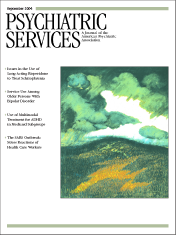Relationship Between Antipsychotic Medication Treatment and New Cases of Diabetes Among Psychiatric Inpatients
Abstract
OBJECTIVE: This study examined data on patients with serious and persistent mental illness in a large state hospital system to determine whether patients who took second-generation antipsychotics were more likely to develop diabetes mellitus than patients who took first-generation antipsychotics. METHODS: A case-control study design was used. A new prescription of an antidiabetic medication was used to identify new cases of diabetes mellitus. Odds ratios were calculated for exposure to second-generation antipsychotics (clozapine, risperidone, olanzapine, quetiapine, and multiple second-generation antipsychotics) compared with exposure to first-generation antipsychotics. Cases and controls were identified by using a database that contained drug prescription information from the inpatient facilities that were operated by the New York State Office of Mental Health. Data from January 1, 2000, to December 31, 2002, were examined. Among 13,611 unique patients who received antipsychotics, 8,461 met entry criteria of being hospitalized for at least 60 days and not having an antidiabetic medication prescribed in the past. A total of 181 of these inpatients received prescriptions for an antidiabetic medication at least 30 days after their admission. Eight controls (N=1,448) for each case (N=181) were matched by calendar year, length of observation period, race, age group, and diagnosis, giving a total sample of 1,629 patients. RESULTS: Statistically significant elevations in risk were seen among patients who received more than one second-generation antipsychotic or clozapine or quetiapine, compared with patients who received first-generation antipsychotics alone. Although not statistically significant, odds ratios for olanzapine and risperidone were also elevated. Conditional logistic regression adjusting for gender and age did not change the results. CONCLUSIONS: Exposure to multiple second-generation antipsychotics or clozapine or quetiapine significantly increased the risk of treatment-emergent diabetes mellitus.



